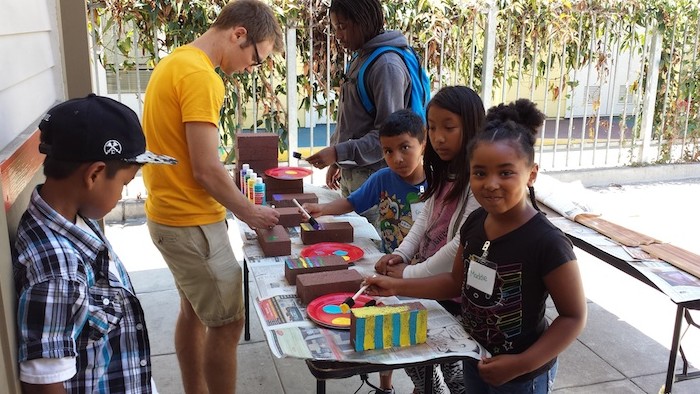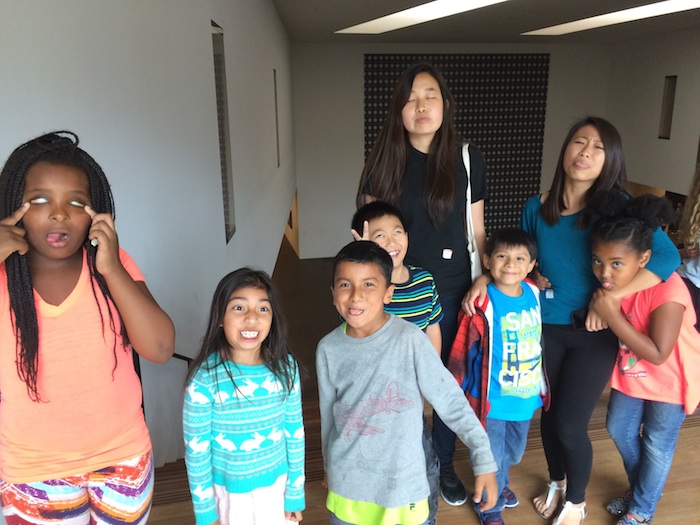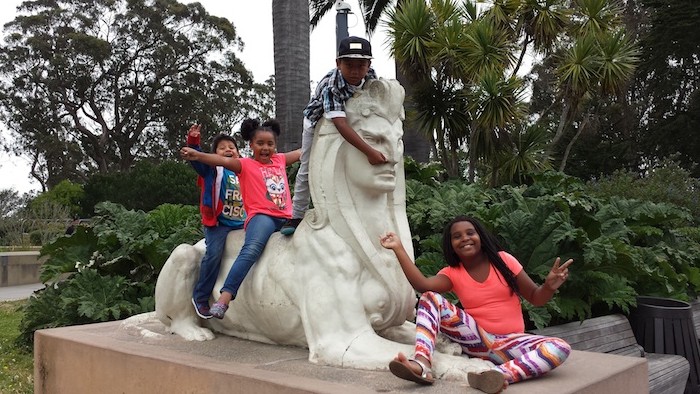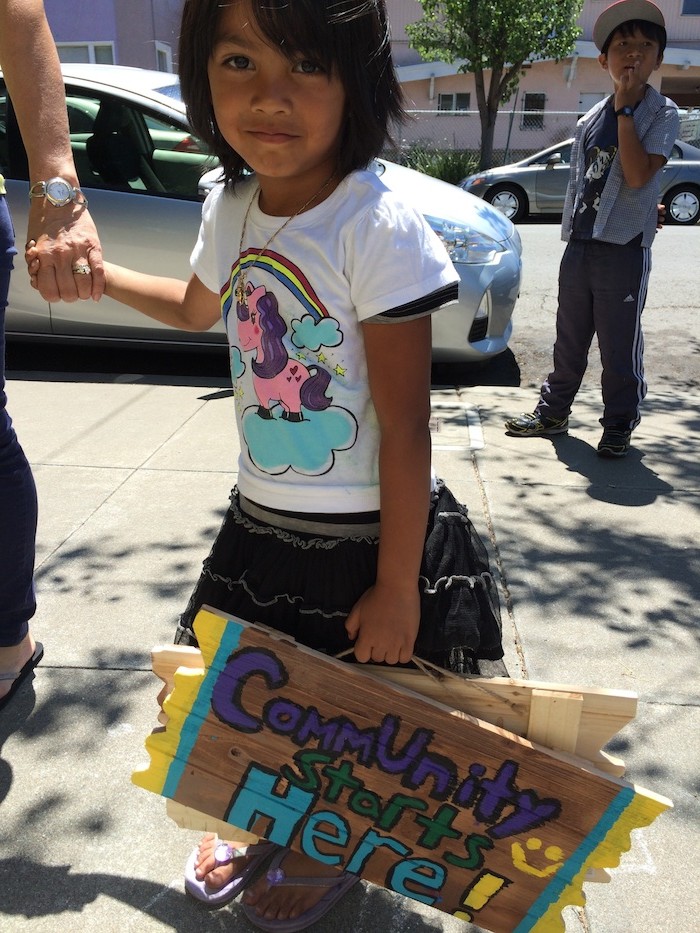Caring for kids has to be one of the best and worst things for one’s health. For instance, last week a kid’s head was in the clouds and she wandered off during a field trip. That really wasn’t fabulous for my blood pressure. Even so, these children have healed me in ways I didn’t know I needed. They unknowingly have been living examples of Dietrich Bonhoeffer’s vision of ministry in Life Together–to me and to their neighbor. They have profoundly shaped me in my successes and failures of striving to live out this vision of ministry through their love and grace.
The Ministry of Helpfulness
“Nobody is too good for the meanest service” (Bonhoeffer 100).
A couple of time I’ve stayed to scrub the floor of art projects gone rogue or accidental goldfish stampedes. One day one of our campers, a too-cool-for-school skateboarder donning a backwards cap and a big smile, asked to help. A domino effect occurred, and I was soon swarmed by tiny hands begging to be of service. Approximately 30 seconds after I asked them to wash the tables, the floor flooded and tiny shoes turned the water into mud as effectively as Jesus turned water into wine. A five-year old girl from the camp, who is homeless, erupted into her trademark crazed laughter when she saw my muddy bare-feet becoming culprits in the mess. She commanded, “Wait there,” grabbed wet paper towels, and began intently to wash me. With each stroke this tiny, fierce, homeless girl imprinted her love and mercy into me.
Three dirty towels later she squinted at me with her devious eyes, stole my shoes, and ran down the block laughing the whole way.
These children could have been doing anything else, yet their hands proclaimed to me, “God’s message of love and mercy” (Bonhoeffer 100) through their seemingly trivial acts. In this upside-down kingdom, a homeless girl that I was so glad to serve pulled a Jesus and literally washed my feet out of love. We focus so much on teaching children, we forget what they can teach us. They teach us to embrace interruption and to joyfully love through small acts of service that probably mean a lot more than we think.

Art projects that will be used to beautify the community garden
The Ministry of Listening
“The beginning of love for brethren is learning to listen to them” (Bonhoeffer 97)
Narrative is an integrative process. Through sharing personal narrative, we put together the messy pieces of our lives and explain how we are somehow still hanging together. Narratives help us discover what is meaningful in our lives. To honor a narrative, we must cultivate a spirit of listening.
One day in the after hours of camp I was painting a sign: “Community Starts Here!” Ty* approached me, laughed at my horrendous artwork, sat, and began to share his narrative, his own difficult life story, with me. After half an hour he said in a half-joking accusatory voice, “Why are you being so quiet!?”
With probably too much honesty for a 10 year old I slowly replied, “I wish I had the right things to say to make everything better. But I don’t.”
His gaze dropped to the ground.
I was paralyzed by Bonhoeffer’s words, “What can weak human words accomplish for others? Are we like the professionally pious, to “talk away” the other person’s real need?” (Bonhoeffer 104). I couldn’t bring myself to speak false hopes that his absentee parents or his daily bullying would magically become easier if he just accepted Christ. I couldn’t quote a couple of bible verses to make everything alright. God gives us His word and lends us His ear. I forgot that the purpose of listening, “with the ears of God is so we can speak the Word of God” (Bonhoeffer 99).
The Ministry of Proclaiming
“The speaking of God’s word is beset with infinite perils” (Bonhoeffer 104).
But what does it mean to speak the word of God?
“That unique situation in which one person bears witness in human words to another person, bespeaking the whole consolation of God, the admonition, the kindness, and the severity of God” (Bonhoeffer 104). The only thing I could do was look Ty in the eye and tell him what I know with the deepest fiber of my being, “You are loved, so loved; by God, by me, by your friends. You are stronger than you think.”
His eyes lit up, “Me? Strong? Really?!”
This is the beginning of my discerning process of learning when to listen, and when and what to speak. I learned that we must all put to death both the impatient-uninterested listener along with the pious prattler of words.

The Ministry of Bearing
“Bear one another’s burdens and so fulfill the law of Christ” (Gal 6:2).
The second day of camp, the leaders were entrusted with stories of children’s past: a father’s recent murder, escaping the Burmese war, houses that were burned down, a father who tried to drown a mother. When Ty told me his story, my heart was painfully overwhelmed. I saw his kind-hearted, goofy nature was slowly eroding away. Part of me wanted to steal these children away and other part wanted to run away and forget all I’ve seen and heard.
One day a nursing classmate asked our dean, “How do we care for our patients without being too emotionally attached?”
The dean of the nursing school kindly laughed, “That is not possible.”
The Christian has no choice but to bear, to sustain, to suffer the burden of a brother or sister: “It is only when he is a burden that another person is really a brother and not merely an object to be manipulated” (Bonhoeffer 100). God bore with us from the fall, through our unfaithfulness in the desert, to God suffering in the person of Jesus through the cross. A Christian’s life in community can be seen entirely through the framework of seeking to bear the Cross that Christ bore for his brothers and sisters.

I fully admit, I am in no way qualified to supplement Bonhoeffer’s categories of ministry with a my own construction. However, I’m an impetuous undergrad so I’m going to go for it.
The Ministry of Accepting Love
Only when we allow ourselves to be served by others can we look upon them as Jesus– the ultimate servant.
No more of this “individualization” crap.
“Out of place” is a generous descriptor, as I resembled a gangly teenage boy awkwardly asking a pretty girl out when I began canvassing. Thankfully I was with Russell Jeung, my site mentor, who lives in the community and is known and loved here. When the neighbors saw Russell approaching they would smile and eagerly invite us in. Every threshold we crossed, I was privileged to catch a glimpse into a vibrant cultural enclave, intentionally invisible from the public eye. Each home we entered held stories of woe (robbery), joy (green cards), fear (drug lords), tragedy (murders), strength (family), and hope. These narratives were intricately sewn into tapestries draped on the wall; they slowly wafted in like the smell of a traditional Thai dish; they looked like three barefooted grandmothers graced with wrinkles laughing in Burmese. I, a 20-year old white upper-middle class girl, a stranger, a foreigner, was embraced by people of peace; I was given water and invited to sit, rest, take off my shoes, and accept love. In this upside-down kingdom I was accepted as a foreigner by foreigners, and I felt oddly whole.
Accepting love requires humility; one of the highest virtues espoused by the early church fathers. Allowing oneself to be served fosters trust and interdependence; it kills colonizing mentality and the Western god of nirvana through individualization, and allows others the blessing of being the hands and feet and eyes and ears of Jesus.

At the DeYoung Museum in San Francisco, the grand Sphinx was humbled by the nose-picking love of these kids.

